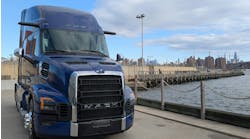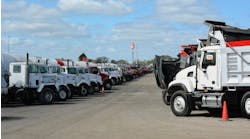FORT WORTH, Texas—Might the new Peterbilt Model 589 be the end of the line for a body style that has defined American trucks for nearly 70 years?
“If you go back to our history, it's every 15 to 20 years we redo the traditional Peterbilt truck,” Peterbilt GM Jason Skoog told FleetOwner during a pre-drive walkaround at the Model 589 reveal event here. “So this [design] will carry us at least into the 2040 timeframe. You can never predict the future, but I would say, ‘quite possibly.’”
The “iconic long and tall styling,” as Skoog described it, goes back to the Model 351, built from 1954 through 1976, followed by the Models 359, 379, and 389.
The style has created a “passionate Peterbilt enthusiast community” and the “unique aspirational quality” that make the classic Petes the “most desired trucks” in North America, Skoog said during a Q&A with industry journalists.
That enthusiasm was clear at the Pride & Class Truck Show held in conjunction with the reveal, Skoog explained.
“I spent about two hours out there, and it's just incredibly humbling and touching at the same time,” he said. “When you have conversations with those folks about how important the traditional Peterbilt truck has been to them—in their lives, their businesses—and they dedicate thousands of dollars, or tens of thousands or hundreds of thousands to put these show trucks together."
“It's really an incredible part of our business.”
See also: Gallery: Peterbilt unveils "legendary" Model 589
Peterbilt is working to reward loyal customers during the transition, closing out Model 389 production this year with a final limited-edition Model 389X—although “few, if any” of those build slots are still available, Skoog noted during the May 9 ceremony. Similarly, the first 589 units of the Model 589 will be recognized with a plate on the passenger-side dash noting the sequential number of its build.
“If you're lucky enough to purchase one of those first 589 of these beautiful trucks, you will be so happy in five years, in 10 years, in 20 years—to know that you have one of the first of these great trucks,” Skoog said.
The Model 589 will be available for customer orders in August, for 2024 delivery.
Peterbilt Model 589 specifications
As Skoog explained, Peterbilt had a very practical reason for the redesign: The Model 389 had been the last truck rolling off the line that did not have the wider, modern 2.1-meter cab. Drivers will immediately recognize the additional space between the seats, and the factory floor will benefit from a common cab platform, he noted.
Otherwise, the nearly 10-year redesign program focused on staying true to the style heritage and the elements customers “most value.”
“Our world-class engineering team spent thousands of hours to seamlessly integrate design attributes of those traditional trucks into the wider Peterbilt cab you find in the Models 579 and 567,” Skoog said. “At every step of the way, new solutions were proposed. We modeled them, we evaluated them, and we scrutinized them. When the final full-scale model came to life, the connection to the heritage was evident—without any compromise to the performance, efficiency and innovation that are the hallmarks of our products."
“We knew that we were ready.”
Model 589 specifications include:
- Front axle: 12,000 to 22,800 lb.
- Rear axle: 21,000 to 78,000 lb.
- Max horsepower: 405 to 510 hp
- Peak torque: 1,450 to 1,805 lb.-ft.
- Sleeper: 44 to 80 in.
Powertrain options
Paccar MX-13
- Configuration: Inline six-cylinder
- Displacement: 12.9 liters
- Horsepower: Up to 605 hp
- Peak torque: Up to 2,050 lb.-ft.
- Base warranty: Two years, 250,000 miles
Cummins X15
- Configuration: Inline six-cylinder
- Displacement: 14.9 liters
- Horsepower: Up to 605 hp
- Peak torque: Up to 2,050 lb.-ft.
- Base warranty: Two years, 250,000 miles
Transmission
Eaton FR/RT
- Manual
- 9, 10, 11, 13, 15, 18 speed
TX-12 Endurant HD
- 12-speed automated
- On-highway fuel efficiency
TX-18 Endurant HD
- 18-speed automated
- On- and off-highway, high performance
Allison 4000, 4500, 4700
- Highway series
- Rugged Duty series
- Oilfield series
- Emergency Vehicle series
Interior
Detachable sleepers
- 44-in. low roof
- 58-in. low roof
- 58-in. high roof
- 72-in. low roof
- 72-in. high roof
- 80-in. high roof
Legendary package
Exterior
- Polished fenders
- Fender skirt and lower-hood overlay
- Bright cab, sleeper rockers
- Script and spear hood side emblem
Interior
- Door pad emblem
- Script headrest stitching and perforation
- Dash emblem



